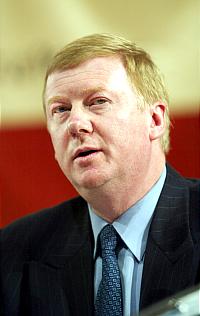 |
|
MT
The head of Russia's electricity monopoly Anatoly
Chubais |
Anatoly Chubais is getting back into politics.
The head of Russia's electricity monopoly will run in the third spot
on the Union of Right Forces' electoral list to try to help the pro-business
party get the votes it needs in December's parliamentary elections, a
party official said Tuesday.
"We thought long and hard and then decided that we thought that
Chubais was the right person to help our party increase its rating,"
the official said, speaking on condition of anonymity.
Some, however, say that bringing in Chubais, whose controversial role
in the privatizations of the 1990s won him many enemies among ordinary
people and among the elite, could backfire for the party, known as SPS.
SPS "should think carefully about how many votes they will gain
with Chubais and how many votes they are going to lose with his presence,"
said Dmitry Orlov, deputy director of the Center of Political Technologies.
On the other hand, even some who do not like Chubais see him as a man
able to get things done.
The party also is bringing in Alfred Kokh, like Chubais a privatization
chief who was involved in the tainted sell-offs of the last decade. He
left government in 1997 and returned to the scene in 2001 to spearhead
Gazprom's takeover of NTV television.
Kokh will run the party's campaign
Orlov was skeptical of this choice, as well. "Kokh is unlikely
to solve the party's problems. His reputation is more dangerous than any
good job he could perform," he said.
Chubais, a co-founder of SPS, will be preceded on the electoral list
by party leaders Boris Nemtsov and Irina Khakamada. He replaces Sergei
Kiriyenko, the presidential envoy to the Volga Federal District, who ran
with Nemtsov and Khakamada in 1999.
Chubais got President Vladimir Putin's blessing to run for the State
Duma on the SPS ticket, the party official said.
Leaders of rival parties had little good to say about SPS' decision.
"It is just as likely to make voters leave SPS and vote for Yabloko
or pro-Kremlin United Russia as it is to attract people who are for a
savage Chubais-style kind of capitalism," said Sergei
Mitrokhin, deputy chairman of the liberal Yabloko party.
Leonid Ivanchenko, deputy leader of the Communist Party, said there
must be a crisis inside SPS "if they could not find anyone else except
Chubais for the third spot."
Duma Speaker Gennady Seleznyov, a former Communist who heads his own
party, was quoted in Kommersant on Tuesday as saying that Chubais will
only help SPS "get out of the political scene."
In the 1999 Duma election, SPS got 8.52 percent of the vote, passing
the 5 percent threshold for winning seats on the basis of the party lists.
The SPS faction now has 38 deputies in the 450-seat lower house.
But the party's rating has fallen. The latest poll by the All-Russia
Center for the Study of Public Opinion, or VTsIOM, showed a mere 4 percent
rating for SPS, although the poll has a margin of error of 3.4 percentage
points.
"We are well aware of our ratings," the SPS official said.
"This is why we chose Chubais. We are a right-wing party and we needed
someone able to demonstrate to our voters that big business is on our
side."
According to a July survey carried out by the Public Opinion Foundation,
52 percent of Russians have a negative feeling about Chubais, while only
8 percent have a positive feeling.
The bulk of the SPS electorate is now people belonging to the upper-middle
class who have done well in the new economic system. But the electorate
used to be broader, said Andrei Ryabov, a political analyst at the Carnegie
Moscow Center.
"If in 1999 SPS got the votes of people who even if they did not
have access to economic resources had strong anti-communist feelings,
SPS has now lost this part of its electorate. This is why they have such
a low rating," he said.
One reason for this, the analysts said, is linked to the indecision
of SPS leaders about whether to be close to those in power.
Nemtsov's press secretary, Lilia Dubovaya, said SPS is a rightist party
that supports the interests of business. "We back government policy
when we think it is defending our rightist interests, but we criticize
them when they carry out a leftist policy," she said.
Ryabov said Chubais will not be able to help SPS win back the liberal,
anti-communist electorate, but he could bring in the votes of those who
have profited under the current system.
"The Russian political system is built in such a way that every
party has its small niche," Ryabov said. "SPS understands that
they are not capable of taking votes from the centrists or from the Communists.
But for a certain segment of the electorate Chubais is like a vacuum cleaner."
Putin and the Kremlin bureaucrats are widely believed to dislike Nemtsov,
and according to Ryabov, Chubais is the person able to smooth things over
for the party.
"For other parties it would not be a serious problem [to have bad
relations with the Kremlin], but for SPS, whose main principle is to be
friendly with those in power, it is a serious problem. But Chubais always
finds a way of reaching an understanding with the Kremlin," Ryabov
said.
See also:
Yabloko and
SPS
|